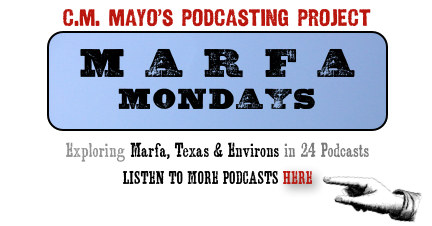|
Author of The Last Prince of the Mexican Empire, etc. |
|
|
C.M. Mayo < Marfa Mondays or Short Nonfiction <
|
This article is a partial transcript
of the Marfa
Mondays Podcast # 14 Click here for the complete transcript . |
|||
 OVER BURRO MESA AND INTO APACHE CANYON Encounters in the Apachería  C.M. MAYO |
|||
|
Fall 2015 Also a podcast. Listen in anytime here. |
|||
 I had ghosts on my mind—not
in a spooky way, just stray thoughts about long-gone people on
a bright, hot morning in the Big Bend National Park. In the foothills
of the Chisos, I parked on the road-side. My aim was to hike
over Burro Mesa west into Apache Canyon, to a corral where Apaches
stashed stolen horses, and to explore an arrow quarry. I had ghosts on my mind—not
in a spooky way, just stray thoughts about long-gone people on
a bright, hot morning in the Big Bend National Park. In the foothills
of the Chisos, I parked on the road-side. My aim was to hike
over Burro Mesa west into Apache Canyon, to a corral where Apaches
stashed stolen horses, and to explore an arrow quarry. The week before in this canyon, two Italian women fended off a mountain lion. Apparently it was a young lion and their screams caused it to scramble off—but that wasn't the kind of adventure I was looking for. I figured my guide, Charlie Angell, could handle any critters better than I could. Sun blasted down. The only clouds were wisps, as if from a paintbrush dipped in milk. Thorns snagged my jeans. The trail became so faint, I surely would have lost it on my own. Just when the hill dipped, then came another trudge up another rise through whips of ocotillo, lechugilla, biznaga, beargrass, stunted soap trees... Many had been incinerated, probably from lightning strikes. No sign of burros on Burro Mesa. In two hours in this merciless landscape, we had seen no animal tracks, no scat; one lizard; one butterfly; two ravens. It began to seem we were hiking not so much to a place but into the past, for this was a soundscape deeply strange to me. I live in Mexico City, one of the biggest in the world, where the thrum of traffic surges and fades, but never ceases. On myriad saint days, firecrackers pop like popcorn; weekends, the thump-a-thump-a of parties. Helicopters roar; dogs bark. Less than two centuries ago, Burro Mesa and Apache Canyon, indeed, the whole of the Big Bend, were Mexican territory—Mexico City the capital. But notionally. Maps of the period tell the truer story, a blank space with a name that was a shrug of ignorance or, for those who had heard the stories of kidnappings and scalpings, a drum-beat of horror: LA APACHERIA. Finally, not that there was anyplace to sit, we sat down. "Drink up," Charlie insisted, handing me another bottle of water. And this was when, suddenly as that mountain lion must have appeared, a lone figure carrying a pole taller than he was, loomed above us. A Texan in expensive-looking drab olive gear. He'd been hiking for several days, he said brightly—yesterday, the Mesa de Anguila. Mighty surprised to see us. We were the first hikers he'd encountered in the past three days. And the pole? For scaring mountain lions. But it didn't weigh much; it was bamboo. After twenty years, its bottom was starting to split-he lifted it to reveal a mass of duct tape. From his flask, he drank water, but he did not sit down. In a moment, he and his fabulous pole had disappeared down the hill. We found the dry stone corral tucked against the mountain, blanketed in shade. It was filled with rubble and brush. Beyond a waist-high forest of creosote, the arrow quarry would have been easy to miss. It was not a hole in the ground, but a cliff of flaky-looking dark rock. Broken arrowheads lay all about: bone white, pink, orange, some tinged lavender. Before I put it back, I held one in my hand. Who knew how old it was, a hundred, five hundred years? I tried to conjure an image of the hands that had chipped, so expertly, until this triangle, a form at once unfathomably ancient, life-giving, and deadly, emerged. It was probably a man, probably older than most in his tribe— let's say he had an arthritic knee. A claw strung onto his necklace. |
|||
|
|
|||
|
|
|||
|
|
|||
|
|||
 |
